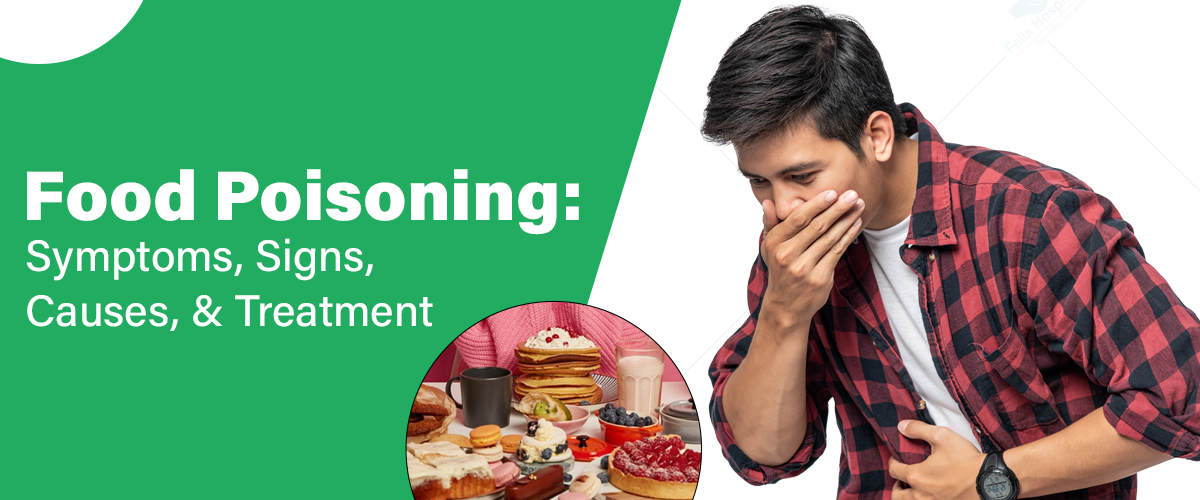
Subscribe to our

Food poisoning, also known as foodborne illness, arises from consuming food or beverages contaminated with harmful bacteria, viruses, parasites, or toxins. Symptoms typically include nausea, vomiting, diarrhea, abdominal pain, and sometimes fever. Recognizing food poisoning early is crucial because it can prevent severe complications and ensure timely treatment. Proper food handling and hygiene practices are key to preventing such illnesses and protecting overall health.
Feeling unwell from food poisoning? Call +91 9667064100 or simply click here for prompt treatment and support.
Food poisoning, or foodborne illness, occurs when you consume food or beverages contaminated with harmful bacteria, viruses, parasites, or toxins. These contaminants disrupt the digestive system, leading to a range of uncomfortable symptoms which may include nausea, vomiting, diarrhea, abdominal pain, and sometimes fever.
Food poisoning can manifest in various ways depending on the type of contaminant and the individual's overall health. Food poisoning symptoms can range from mild discomfort to severe distress.
Common signs to watch for include:
Symptoms may appear within hours of consuming contaminated food, but sometimes can take days to manifest. They typically last from a few hours to several days, depending on the severity of the infection. In rare cases, food poisoning can affect the nervous system, causing:
Food poisoning can stem from various sources, often involving factors that compromise food safety at different stages. Understanding these causes is essential for prevention and maintaining health. Here are the primary causes of food poisoning:
Contamination can occur during any phase of food handling, including:
Most instances of food poisoning are mild and typically resolve on their own within a few days. However, more severe cases or individuals at higher risk may require targeted treatment of food poisoning:
Although these treatments can manage symptoms, they do not speed up recovery. The body needs time to eliminate harmful substances and heal naturally.
Most food poisoning cases can be treated at home, but medical attention is needed in certain situations. Seek prompt medical care if you or someone you know experiences:
For Adults:
For Children:
Preventing food poisoning requires diligent attention to food safety and hygiene practices. By adopting simple yet effective measures, you can significantly reduce the risk of foodborne illnesses. Here are key strategies to keep in mind:
Special Considerations
Certain groups are more susceptible to severe food poisoning and should exercise heightened caution:
Members of these groups should follow stringent food safety practices and may need to avoid foods that pose a higher risk.
Long-term Effects of Food Poisoning
While most people recover fully from food poisoning, some may experience long-term health issues, such as:
These long-term effects are rare but highlight the importance of addressing food poisoning seriously and seeking medical attention when needed.
Dr. Jagatjot Singh Gill
Dr. Jagatjot Singh Gill, D.M. in Gastroenterology, is a highly skilled gastroenterologist with over 11 years of experience. He specializes in diagnosing and managing gastrointestinal disorders, including food poisoning. Dr. Gill offers personalized care and tailored treatment plans to effectively manage food poisoning and other digestive issues, ensuring comprehensive patient well-being.
Dr. Amrit Yog Datley
Dr. Amrit Yog Datley, DrNB in Gastroenterology, is a distinguished gastroenterologist with over 8 years of experience. He excels in diagnosing and managing various gastrointestinal conditions, including food poisoning. Dr. Datley uses advanced diagnostic techniques and customized treatment plans to effectively address food poisoning and enhance digestive health.
Food poisoning is a common yet serious condition that affects millions annually. By understanding its symptoms, causes, and treatment options, you can better safeguard your health and that of your loved ones. Adhering to proper food safety practices can significantly lower your risk of foodborne illness. If you experience severe or persistent symptoms, don’t hesitate to seek medical help. Prioritize your health and enjoy your meals with confidence!
Experiencing symptoms of food poisoning and need relief? Contact us at +91 9667064100 for expert treatment and guidance.
1.) What are the initial signs of food poisoning?
The first signs of food poisoning often include nausea, vomiting, and diarrhea. You might also experience abdominal pain, cramps, fever, or headache. These symptoms typically begin within hours of consuming contaminated food or beverages.
2.) How can I distinguish between food poisoning and a stomach bug?
Food poisoning usually results from eating contaminated food and often causes nausea, vomiting, and diarrhea shortly after eating. A stomach bug, or viral gastroenteritis, can have similar symptoms but may also include low-grade fever and muscle aches, and it generally spreads through person-to-person contact.
3.) How long does food poisoning typically last?
Food poisoning usually lasts from a few hours to several days, depending on the severity and type of contaminant. Most cases resolve on their own within 1 to 3 days, though symptoms can persist longer in severe cases.
4.) When can I resume eating normal food after food poisoning?
After experiencing food poisoning, it's advisable to start with bland, easy-to-digest foods once symptoms begin to improve. Typically, you can return to a normal diet within a few days, but ensure you’re fully recovered and consult a doctor if symptoms persist.
5.) How is food poisoning diagnosed?
Food poisoning is diagnosed based on symptoms, medical history, and sometimes stool tests. A healthcare provider may ask about recent food consumption and perform tests to identify the specific bacteria, virus, or toxin responsible for the illness.
6) Is it safe to eat roti during food poisoning?
Eating roti during food poisoning is generally safe if your symptoms have started to improve. Opt for plain, easily digestible foods and avoid spicy or oily dishes. Always consult with a healthcare provider if you're unsure about your diet during recovery.